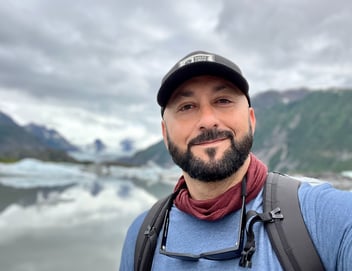
Are you ready for our Nature Poetry Competition? One of the most delicate genres to work in, the beautiful realm of nature poetry is filled with tiny tales to unfold with your beautiful words. We had the chance to interview Guest Judge Aimee Nezhukumatathil to ask her expert advice on writing nature poetry.
Nature poems can tackle big ideas about life, love, and loss, but they often do so by focusing on simple things. How do you find the right balance between being concrete and focusing in on a natural element, while also saying something deep about the wider world?
Thank you so much for that observation. I grew up reading a bunch of highly scientific nature books/magazines, but something in those books made me always want to make metaphors or find a way to make that nature literacy applicable to my life. Honestly being Asian American in the 70s and 80s, not really seeing myself reflected in books or in pop culture TV and movies, made me feel like more of a kinship with the natural world. I may not always be thinking about that — in fact I almost never do when I'm drafting a piece — but in revision I'm always trying to imagine talking to a loved one or best friend, and how to make what I want to say interesting to them. For me, having someone specific in mind, and saying something specific in a poem is actually the only way to get to the universal.
When you write about nature, I’ve noticed that you include so much vivid imagery. Do you have any tricks for bringing a poem’s nature to life for your readers?
Well, I always start with an image. An image for me can be any of the five senses, and then I just start writing towards it, through it, around it, and see what happens afterwards. I never know what I'm writing until after I've completed at least one draft — that goes for both poems and essays. For example, I might think of the smell of mint, and that might make me think of chewing gum, and that might make me think of my mom taking me to the zoo.
In your book “World of Wonders: In Praise of Fireflies, Whale Sharks, and Other Astonishments,” you write about how nature — from the smallest creatures to the tallest trees — holds lessons for us. Is there a lesson from nature that you’ve learned recently that changed the way you look at the world or your writing?
One of the first things that children naturally do is say Look! Look! And by the time they are out of, say, high school, most have stopped sharing that sense of wonderment of the outdoors; for some it’s not ‘cool’ anymore. What I always want to do, whether it’s in the classroom or in this book, is to bring that sense of wonder — that impulse to say LOOK! — back for anyone who forgot that they used to exclaim with astonishment once upon a childhood. I wanted to show that anyone can appreciate and be surprised and delighted about plants and animals if you just slow down a bit. And in that slow-down, I’m hoping that will lead you to a moment of tenderness and isn’t that a wild and wonderful thing? And frankly much needed, I think, especially during the current horrors in our country and the world.
What are you looking for in a winning entry? Any other advice for the writers, especially those who are new to nature poetry?
As someone who has taught nature writing for decades, I suggest to my students for any solid piece of writing: Be as specific as you can. Here in Mississippi where I live, I want to know the names of everything I plant: aster, wax mallow, and the difference between bee balm and bee blossom. Knowing names correctly is everything; it’s a key to connection and tenderness and a turn to kindness. Maybe if you know that pipevine swallowtail butterflies nibble swamp milkweed leaves, you wouldn’t be so quick to mow it on the side of the highway. Or maybe if you knew that indigo buntings (which are bluer than a Mississippi summer sky), and not just ‘some birds’ hang around a place called Sky Lake, you wouldn’t dump garbage in their home.
Start with the five senses. Knock us back to that time you first smelled a dried sand dollar when you were nine. Let us feel the bits of sand tap out of the lunules and into the palm of your hand. If possible, try to draft with your hand as opposed to a laptop — there's a different slowness to taking in the world when you do it that way, I feel (and I think there's actually been studies showing that). I would also try to imagine someone that you are writing to. And stay curious! Don’t just read about one thing. Also, Mother Nature is the best poet. Make time to learn from her.





